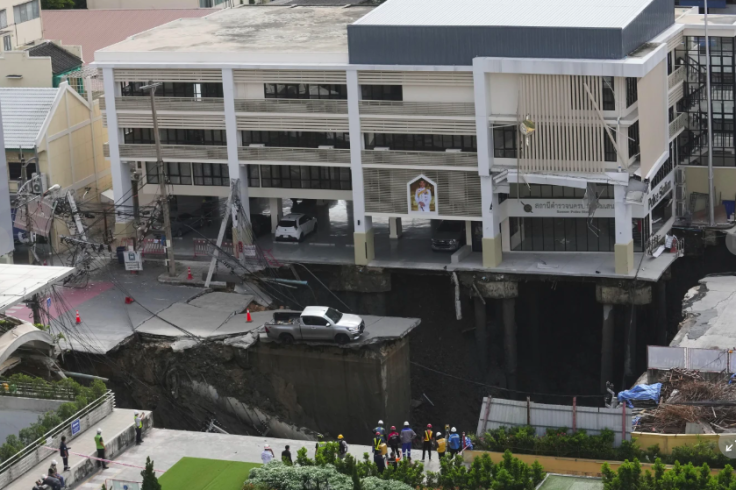Massive Sinkhole in Thailand: Bangkok Road Collapses, Sparking Traffic Gridlock and Panicked Evacuations

Bangkok plunged into chaos on Wednesday when a vast sinkhole swallowed part of Samsen Road outside Vajira Hospital, paralysing traffic, cutting off power and water, and forcing patients and staff to evacuate.
The collapse tore through Samsen Road in front of Vajira Hospital, creating a crater almost 50 metres deep and spanning 900 square metres, according to Reuters.
The ground caved in as cars fell into the sinkhole which also impacted electricity poles and ruptured underground pipes, leaving the heart of the capital in disarray.
Panic On The Streets
When the road buckled, residents described scenes of fear and confusion. Noppadech Pitpeng, a hospital worker, told VN Express that he was jolted awake by a loud rumble before grabbing his belongings and rushing out of the building. 'It felt like the ground was being pulled away,' he said.
Videos circulating on social media showed pedestrians scrambling from cracked pavement as cars reversed from the collapsing roadway.
One witness told AP News the sound of asphalt snapping was followed by a cloud of dust and the crash of concrete falling into the void.
Hospital Services Halted
Authorities cordoned off the site and ordered immediate evacuations. Outpatient services at Vajira Hospital were suspended for at least two days, according to AP News.
While officials stressed the hospital's main buildings remain structurally sound, Bangkok Governor Chadchart Sittipunt warned that a police station next door is at risk, with its foundation partially exposed.
Power and water were cut off in the area, and traffic backed up for kilometres as commuters were diverted onto already crowded routes.
Police urged motorists to avoid the district entirely, warning the disruption could last for days.
Rail Construction Under Scrutiny
Investigators suspect tunnelling work on a new underground rail line contributed to the collapse.
Prime Minister Anutin Charnvirakul told reporters that soil displaced by tunnelling appeared to have shifted beneath the road, destabilising its base, according to Reuters.
Governor Chadchart said the sinkhole may have formed at tunnel junctions, already considered weak points.
Media reports also pointed to a ruptured water pipe that may have eroded soil beneath the surface, triggering the collapse.
Heavy monsoon rains added to the danger, with officials warning that further downpours could destabilise the site.
No Casualties but Severe Damage
Despite the scale of the destruction, no deaths have been reported. At least three vehicles were damaged, but their occupants managed to escape unharmed, according to Reuters.
Prime Minister Anutin called the absence of fatalities 'a stroke of luck' and promised accountability. "We will investigate thoroughly to ensure this does not happen again," he told reporters.
VN Express reported that the Mass Rapid Transit Authority, which oversees the rail project, said engineers are reviewing soil data and tunnel designs to determine what went wrong.
Fragile Foundations
Bangkok, built on soft clay and prone to subsidence, has long struggled with ground stability, especially during the rainy season.
Experts say the sinkhole underscores the urgent need for stricter oversight of major infrastructure projects in the city, which has a population of nearly 11 million people.
For residents like Noppadech, the event was more than a technical failure. 'I've worked here for years and never seen anything like this,' he said. 'You think the ground is solid under your feet—until suddenly, it isn't.'
© Copyright IBTimes 2025. All rights reserved.





















